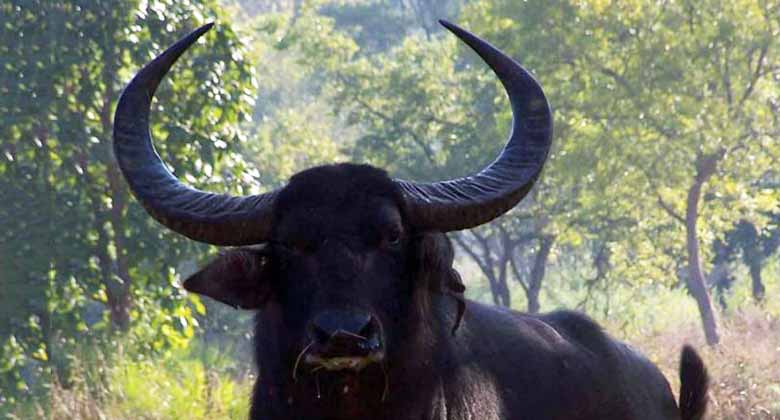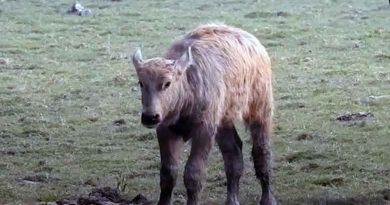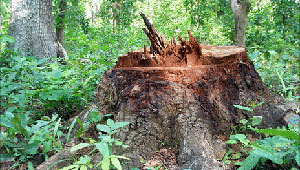Chhattisgarh: Experimental ground for wild buffaloes
Raipur | Correspondent: Despite extensive expenditures in recent years, the Forest Department of Chhattisgarh has failed to bolster the population of its state animal, the wild buffalo. A recent effort to increase numbers by importing wild buffaloes from Assam has been halted by a High Court order.
The department spent substantial sums maintaining domesticated and some wild buffaloes in enclosures for years without conducting DNA mapping, yielding no tangible results. Over a decade, funds were allocated for initiatives like radio collaring, breeding, and sustenance without involving national bodies such as the Centre for Cellular and Molecular Biology, Wildlife Institute of India, Indian Veterinary Research Institute, etc. A NGO, The Wildlife Trust of India managed the conservation efforts exclusively.
Despite a Supreme Court ban, the Forest Department spent Rs 3.5 crore attempting to clone a wild buffalo using a piece of Asha’s ear from Sitanadi Udanti, resulting in an alleged cloned female named Deepasha at the National Dairy Research Institute in Karnal on December 12, 2014, purportedly the world’s first wildlife cloning. However, Deepasha remains unmapped genetically after several years, housed in Jungle Safari with substantial annual expenditures, identified by experts as a Murrah buffalo.
The Central Zoo Authority consulted institutions like the Centre for Cellular and Molecular Biology, Hyderabad, Indian Wildlife Institute, Dehradun, National Dairy Research Institute, Karnal, and Indian Veterinary Research Institute, Bareilly, regarding natural conception but withheld permission for mating Deepasha with any male wild buffalo.
Meanwhile, proposals for costly artificial insemination from the Centre for Cellular and Molecular Biology, Hyderabad, prevented the use of Deepasha’s clone to boost wild buffalo numbers, prompting the shelving of this strategy.
Despite these setbacks and the absence of a long-term strategy, the Forest Department persisted in arbitrary actions. Instead of emulating Odisha and Maharashtra in creating favorable conditions for the purebred wild buffaloes of Bastar, they opted to capture and bring wild buffaloes from Assam without studying climatic differences.
Currently, five wild buffaloes or orBubalus arnee from Assam are held in Barnawapara, their fate subject to a High Court notice following a plea by petitioner Nitin Singhvi. Contrary to Assam’s transfer conditions, four female wild buffaloes remain captive over a year after arrival, alongside a pair brought in 2020.
The Assam government had agreed to send these wild buffaloes to Chhattisgarh on the condition that they would be released into the forest within 45 days. But the 4 female wild buffaloes brought in April 2023 are still kept in captivity in the Barnawapara Sanctuary. Similarly, a male and a female brought in 2020 are also in captivity.
The court was informed that these buffaloes were intended to breed with Chhattisgarh’s wild buffaloes, represented solely by the aging male “Chhotu,” considered unfit at 22-23 years old. The Forest Department sought Central Zoo Authority permission to breed Chhattisgarh’s crossbred wild buffaloes with those from Assam, denied due to regulations against breeding with impure breeds.
Permission for a breeding center at Barnawapara, initially granted in principle despite legal challenges under the Wildlife (Protection) Act prohibiting such centers in sanctuaries, remains pending final approval.
The Forest Department argued that only the third generation of Assam’s wild buffaloes would be released, asserting their health and illegality of captivity under Section 11 of the Wildlife (Protection) Act, which mandates releasing Schedule I wild animals unless unfit.
The petition cites the Supreme Court’s 2012 Godhavarman case, stressing the imperative to maintain Chhattisgarh’s wild buffalo purity. With Chhotu unfit for breeding, crossbreeding with Assam’s impure breed is deemed unacceptable.
To avoid diluting Assam’s wild buffalo gene pool in Barnawapara or Udanti Sita Nadi Tiger Reserve, the petition demands repatriation of Assam’s wild buffaloes.




